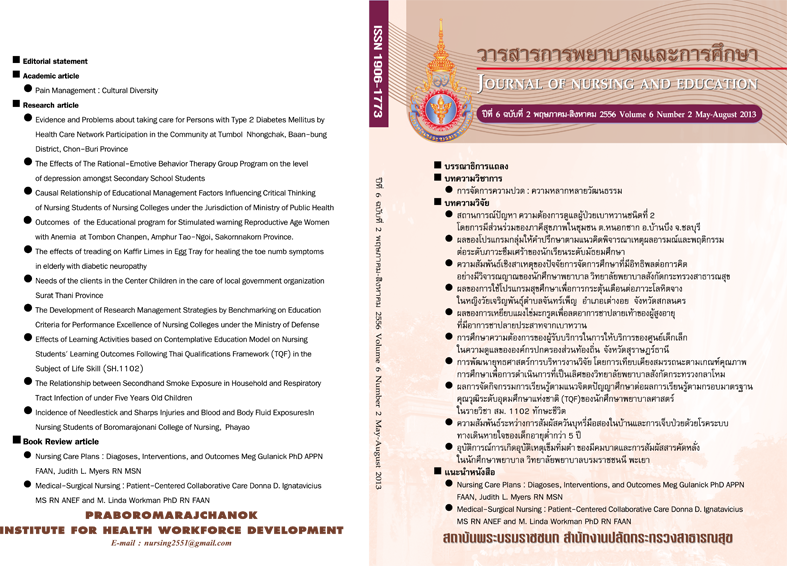ผลของโปรแกรมกลุ่มให้คำปรึกษาตามแนวคิดพิจารณาเหตุผลอารมณ์และพฤติกรรมต่อระดับภาวะซึมเศร้าของนักเรียนระดับมัธยมศึกษา*
คำสำคัญ:
Adolescents, Depression, The Rational-Emotive Behavior Therapy Group Programบทคัดย่อ
บทคัดย่อ
ภาวะซึมเศร้าในวัยรุ่นก่อให้เกิดปัญหามากมาย อาทิเช่น การรับรู้คุณค่าในตนเองลดลง ความสามารถในการเผชิญปัญหา พฤติกรรมการเอาใจใส่ในการเรียนต่ำและอาจก่อให้เกิดอุบัติการณ์ของการเจ็บป่วยทางจิตและการฆ่าตัวตายได้ ดังนั้นการป้องกันและลดภาวะซึมเศร้าในวัยรุ่นถือว่าเป็นสิ่งสำคัญอย่างยิ่ง การวิจัยกึ่งทดลองครั้งนี้มีวัตถุประสงค์เพื่อศึกษาผลโปรแกรมกลุ่มให้คำปรึกษาตามแนวคิดพิจารณาเหตุผลอารมณ์และพฤติกรรมต่อภาวะซึมเศร้า การรับรู้คุณค่าในตนเอง ความสามารถในการเผชิญปัญหาและพฤติกรรมการเอาใจใส่ต่อการเรียนของนักเรียนระดับมัธยมศึกษา จังหวัดเชียงราย จำนวน 60 คน แบ่งเป็นกลุ่มทดลองและกลุ่มควบคุม กลุ่มละ 30 คน เครื่องมือวิจัยคือ โปรแกรมกลุ่มให้คำปรึกษาตามแนวคิดพิจารณาเหตุผลอารมณ์และพฤติกรรม และเครื่องมือในการเก็บรวบรวมข้อมูลประกอบด้วย แบบประเมินภาวะซึมเศร้า แบบประเมินการรับรู้คุณค่าในตนเอง แบบวัดความสามารถในการเผชิญปัญหาและแบบประเมินพฤติกรรมการเอาใจใส่ต่อการเรียน มีค่าสัมประสิทธิ์ความเชื่อมั่นเท่ากับ 0.82, 0.75, 0.94 และ 0.85 ตามลำดับ วิเคราะห์ข้อมูลโดยใช้สถิติเชิงพรรณนา สถิติการวิเคราะห์ความแปรปรวนทางเดียวและสองทางแบบวัดซ้ำ ผลการวิจัย พบว่า
1) กลุ่มทดลองมีคะแนนเฉลี่ยการรับรู้คุณค่าในตนเอง ความสามารถในการเผชิญปัญหาและพฤติกรรมการเอาใจใส่ต่อการเรียนสูงกว่ากลุ่มควบคุม และคะแนนเฉลี่ยดังกล่าวในระยะก่อนเข้าโปรแกรมฯ แตกต่างกับระยะทันทีหลังโปรแกรมฯสิ้นสุดและระยะติดตามผล 1 เดือน (p ฃ 0.05)
2) กลุ่มทดลองมีคะแนนเฉลี่ยภาวะซึมเศร้าต่ำกว่ากลุ่มควบคุมและคะแนนเฉลี่ยของภาวะซึมเศร้าในระยะก่อนเข้าโปรแกรมฯ แตกต่างกับระยะทันทีหลังโปรแกรมฯสิ้นสุดและระยะติดตามผล 1 เดือน
(p ฃ 0.001)
บุคลากรทางการศึกษาและทางด้านสุขภาพควรส่งเสริมและสนับสนุนการใช้โปรแกรมฯ ดังกล่าวเป็นแนวทางในการป้องกันและลดความรุนแรงของภาวะซึมเศร้าและป้องกันปัญหาสุขภาพจิตที่อาจเกิดขึ้นตามมา
คำสำคัญ : วัยรุ่น ภาวะซึมเศร้า โปรแกรมกลุ่มให้คำปรึกษาตามแนวคิดพิจารณาเหตุผลอารมณ์และพฤติกรรม
Abstract
Depression in adolescent is caused many problems such as low-self esteem, problem-coping ability , learning attention are low and may be risk for the prevalence of mental illness and suicide. Thus, prevention and decreasing depression in adolescents are important. This quasi-experimental research study was conducted using Repeated Measures designs for the purpose of examining the effect that the Rational-Emotive Behavior Therapy Group on the level of depression had on
high-school students’ depression, self-esteem perception, problem-coping ability and learning
attention. The subjects, totaling 60 that were divided equally into a controlled group and an
experimental group. Research tools included depression state questionnaires, self-esteem
questionnaires, problem-coping questionnaires and learning attention questionnaires which yielded the reliability values of 0.82, 0.75, 0.94, and 0.85, respectively. The data were analyzed using
descriptive statistics, One-Way Repeated Measures design and a Two-Way Repeated Measures design. The study revealed the following results.
Firstly, The experimental group members’ average scores in self-esteem perception,
problem-coping ability and learning attention were significantly higher than the controlled group members’ and were significantly different from their average scores after the exposure and during the 1-month follow-up, at p d” 0.001, 0.01 and 0.05, respectively.
Secondly, The experimental group members displayed a significantly lower average
depression score than did those of the controlled group. Also, in the depression category, the
experimental group members’ average pre-exposure score was significantly different from their average scores after the exposure and during the 1-month follow-up, at p d” 0.001.
Based on the findings, it can be recommended that educational and healthcare personnel should be encouraged to use this program to prevent depression or reduce its intensity amongst
teenagers, thereby preventing them from developing potential mental health problems.
Keywords : Adolescents, Depression, The Rational-Emotive Behavior Therapy Group Program






